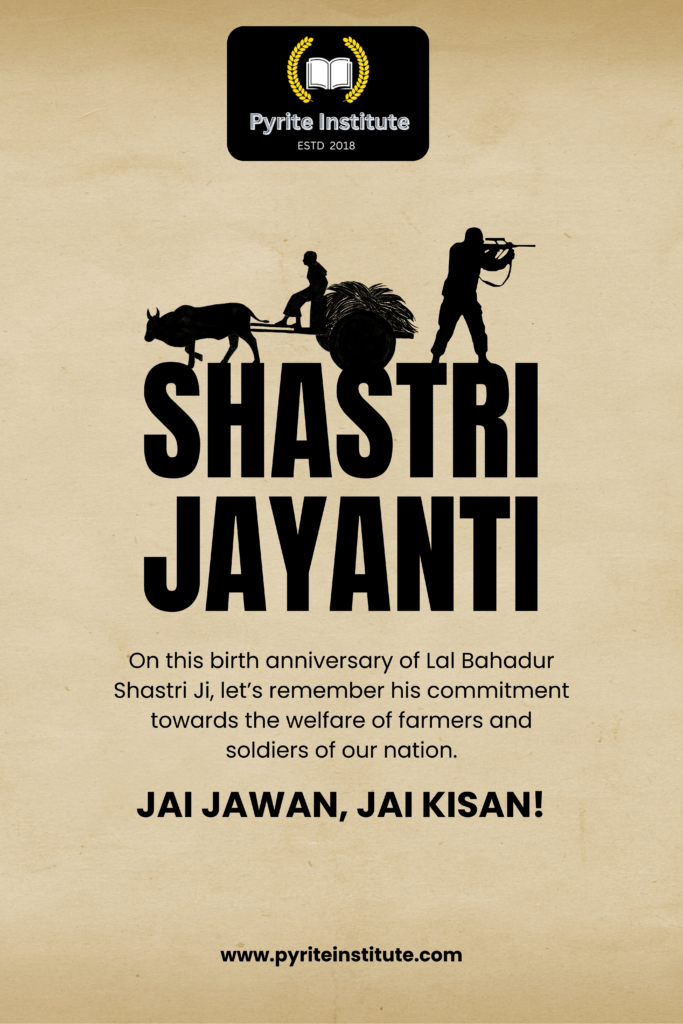Lal Bahadur Shastri, born on October 2, 1904, in Mughalsarai (now in Uttar Pradesh) was one of India’s most revered leaders. He came from a humble background, losing his father at a young age and growing up in relative poverty. Despite these challenges, Shastri’s determination and dedication to education led him to graduate from Kashi Vidyapeeth, where he earned the title “Shastri,” meaning scholar.
Shastri was deeply influenced by Mahatma Gandhi and the principles of non-violence and simplicity. He actively participated in India’s freedom struggle, getting arrested several times for his involvement in movements like the Non-Cooperation Movement and the Salt Satyagraha. His commitment to the nation was unwavering, and this earned him respect among both his peers and the people of India.
After India gained independence, Shastri held several key positions in the government, including serving as the Minister of Railways and Transport, and later, the Minister of Home Affairs. However, it was in 1964, after the passing of Jawaharlal Nehru, that Shastri stepped into the role of the second Prime Minister of India.
What Did Lal Bahadur Shastri Work for Our Country?
Lal Bahadur Shastri’s contributions to India are immense, and his work continues to impact the nation even today. Here are some of the key areas where Shastri worked for the betterment of India:
“Jai Jawan, Jai Kisan” Slogan: Perhaps the most iconic moment in Shastri’s leadership was his famous slogan “Jai Jawan, Jai Kisan,” which means “Hail the soldier, Hail the farmer.”
This slogan captured the essence of his vision for India—a country that could thrive only if it protected its borders (through the efforts of its soldiers) and ensured food security (through the hard work of its farmers). Shastri recognized that the strength of the nation lay in both its defense forces and agricultural backbone.
Indo-Pak War of 1965: During Shastri’s tenure as Prime Minister, India faced the challenge of the Indo-Pak war in 1965. Despite the limited resources at India’s disposal, Shastri led the country with remarkable courage and resolve. His calm and determined leadership during the war earned him widespread admiration. Under his leadership, the Indian army responded decisively and the Country stood United.
Green Revolution and Agricultural Reforms. At the time Shastri became Prime Minister, India was grappling with severe food shortages and hunger. Shastri took bold steps to promote the Green Revolution, which focused on improving agricultural productivity through better farming techniques, irrigation and the use of high-yielding seeds. This initiative laid the foundation for India’s self-sufficiency in food production, a legacy that continues to benefit the country today.
Strengthening India’s Unity: Shastri’s leadership wasn’t just about defense and agriculture. He believed deeply in the unity of India. He worked to Strengthen the country’s internal security and advocated for harmony among different communities. His policies aimed to uplift the poor and bridge the gap between the urban and rural populations, ensuring that the fruits of development reached all corners of the country.
Promoting Peace and Diplomacy: Although Shastri was a strong leader during the war, he was equally committed to peace. After the 1965 Indo-Pak war, he signed the Tashkent Agreement with Pakistan’s President Ayub Khan aimed at restoring peace between the two nations. This act of diplomacy showcased Shastri’s balanced approach, where he believed in defending the nation’s sovereignty while also seeking peaceful resolutions.
Leading by Example: Shastri’s personal life was a reflection of the values he stood for. He lived simply, avoided extravagance, and remained grounded despite holding the highest office in the country. His humility and honesty won him the admiration of millions. Even when faced with difficult decisions, Shastri always put the nation first, showing that leadership is about serving the people selflessly.
Legacy of Lal Bahadur Shastri
Lal Bahadur Shastri’s sudden and untimely death in 1966, shortly after the Tashkent Agreement, shocked the nation. Despite his short tenure as Prime Minister, his impact on India was profound. He left behind a legacy of courage, simplicity, and service to the nation. His leadership during a critical period in India’s history demonstrated that great leaders need not be loud or flamboyant sometimes, it is the quiet, resolute leaders like Shastri who leave the most lasting impressions.
Today, Shastri’s name is synonymous with integrity, humility, and dedication to the country. His work for India’s soldiers, farmers, and the nation as a whole continues to inspire future generations. His slogan “Jai Jawan, Jai Kisan” still resonates with the spirit of modern India, reminding us of the values he stood for.
In conclusion, Lal Bahadur Shastri was not just a leader he was a symbol of hope and determination for a newly independent India. His contributions in promoting peace, boosting agriculture, and strengthening the nation’s defense have cemented his place as one of India’s most beloved and respected leaders.

